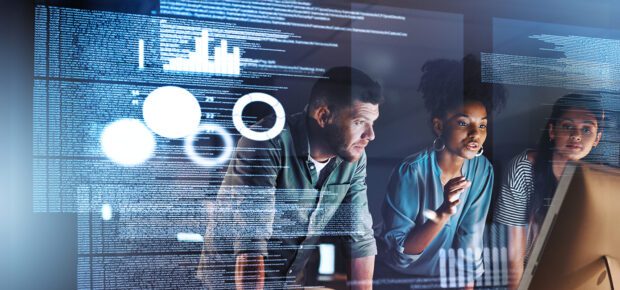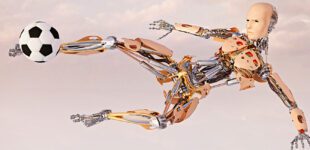September 29, 2025
From networking with other members at events to building new skills, IEEE provides members with a multitude of opportunities to help accelerate professional growth at any career stage. Hear from IEEE members on their involvement with the IEEE community.
Nick Volpe, IEEE Member
I’d say a big skill that I’ve learned as being a part of IEEE is to always look at what other people are doing; see what’s going on in the world.
Which IEEE-related event left an impact on you?
CES. That’s not really something that I would even necessarily think about attending. I don’t know, I’m just a student. What could I possibly learn there? But the second that everybody started encouraging me, I learned so much about different technologies. I learned where the future was going in these different technologies. And that gave me a huge advantage in being able to propel my career forward in order to be prepared in these technologies that are upcoming.
What’s an unexpected benefit of being an IEEE member?
Something that was really unexpected about being an IEEE member that really benefits me is just about any single time that I mention it. No matter where I am in the world, heads pop up because they’re involved in it too. And so that gets us to talking about what they do, what I do, makes a lot of really interesting different connections.
What are your tech predictions for the future?
Something that I’ve been seeing in the past, I’d say maybe 5 to 10 years is the use of very accessible technology.
What exactly does that mean? So, like Arduinos, like Raspberry Pi’s, like this type of little small stuff. A big part of a lot of this accessible technology is that it’s becoming exponentially cheaper. And so with that being said, we’re going to start seeing a lot of technology out there. You know, whether you say like a smartphone, say some really, powerful things like, like Wi-Fi 6, all that good stuff, like, even just like, LoRa, which is a wireless transmission protocol. It was primarily used for, I want to say, like, farming and stuff like that. Now, you can just purchase a small chip for maybe $5 to $20. And so we’re going to see that, I think with a lot of different technologies, whether, you know, like touch screens, who knows how AI is going to be impacted with all this good stuff.
Jenifer Castillo, IEEE Senior Member
Two years ago, I decided that I wanted to do something different.
How did IEEE help you navigate career change?
So I was working in oil and gas, and I was, you know, making my daily job. I was pretty happy in the company where I was and very valued. But, one day I thought ‘what did I want to be when I was a kid?’
And it was what I wanted to be, an astronaut. And I’m very far from that. And I started overthinking about it, and I ended up applying for a position in my new company and I switched from oil and gas to aviation. So now I have to learn again about the industry where I am, and that is keeping me very busy. That’s why I value so much IEEE for being my professional home. I found people in my society, A.E.S.S (IEEE Aerospace and Electronic Systems Society), and they really helped me to feel confident about this transition, to ask whenever I needed to ask a question. And that together with the support of my colleagues and my company, is making all the transition easier.
Yash Puneet, IEEE Member
The IEEE event or conference that’s been most impactful for me is the Rising Stars Conference. The conference has given me the opportunity to connect with companies, many speakers who have brought up many interesting topics in the fields of robotics, AI and different hardware related topics I’m interested in.
And I’ve been able to expand my horizons a lot more through these conversations. With the networking opportunities I get to know about different companies, different projects going on and different things I could get involved in, and that all enriches my education experience as well as my general professional experience through these events.
What’s the best career advice you’ve received?
The best career advice I’ve received is don’t be afraid to ask questions or send messages or contact people as soon as they build a connection. I think initially I was very nervous reaching out to people. Once I did, even if I did make an in-person connection at a conference or an event, I wasn’t sure whether it was appropriate to reach out immediately, what information I could include and stuff like that.
Through different events and talking to a lot of people involved in IEEE the best advice I’ve received from a lot of them was, reach out. There’s no harm in reaching out. There’s always a bunch of opportunities available, and those won’t be available unless I reach out. So sending those messages, putting my foot in, putting my foot forward and really trying to grab the opportunities that are available is the best career advice I received.
What are your tech predictions for the future?
My predictions for automation and robotics going forward, like going into the workforce and going forward in general would be becoming a lot more prevalent in daily lives currently. And I see that progressing a lot further, really becoming incorporated in our daily lives, through a bunch of daily tasks we perform. And access to robotics is becoming easier as the years progressed. So in the future I envision that being even easier, even more accessible, to all, to a variety of different populations.
What’s an unexpected benefit of being an IEEE member?
The IEEE benefit that has allowed me to improve my technical and professional skills the most is actually support for student branches. As a student member, I was involved in the student branch at my university for two years. And IEEE’s contributions allowed us to have a great wealth of technical resources available. So a bunch of components, test material, test equipment, soldering equipment and all of those things to actually build projects and learn through hands-on building.
I was able to work on a bunch of different projects, both smaller projects, smaller personal projects, as well as larger projects for different competitions. And that allowed me to learn a variety of different skills, including programming different microcontrollers such as STM32, which are used a lot in the industry. And getting the experience hands on is not available in a lot of classes. So IEEE support there really helped a lot.
In addition to that, for professional skills, being involved in the student branch, and with IEEE’s benefits of getting access to a bunch of different resources for putting up these events has allowed me to practice leadership skills, and networking skills by talking to a variety of different professors, faculty and students at my university. That’s helped me improve my speaking skills and network with people to get a lot of new opportunities. And yeah, so this is how the benefits have helped me improve both my technical and professional skills.
What challenges face the ethical integration of AI?
Challenges I do envision in integrating AI ethically would be in fairness and transparency, for example, because a lot of these systems are trained on data sets that are available and collected through different surveys or different populations. And these datasets may be large, but a lot of the time they rely on access to technology already, for example. And this does have a possibility of limiting the diversity of data we collect as anyone interacting would need to have access to technology, would need to be able to use technology already, and all this data which the models are trained on would be biased towards this population. So in trying to integrate it more ethically we are sort of reducing its effectiveness against certain populations or certain groups who aren’t able to really provide their data. And through this method it does bring some ethical challenges in really incorporating AI technology more broadly.





 Meaningful Momentum or Running in Place?
Meaningful Momentum or Running in Place? AI Through Our Ages
AI Through Our Ages Liquid Infrastructure: Our Planet's Most Precious Resource
Liquid Infrastructure: Our Planet's Most Precious Resource The Impact of Technology in 2025
The Impact of Technology in 2025 Quantum and AI: Safeguards or Threats to Cybersecurity?
Quantum and AI: Safeguards or Threats to Cybersecurity? Why AI Can't Live Without Us
Why AI Can't Live Without Us Bits, Bytes, Buildings and Bridges: Digital-Driven Infrastructure
Bits, Bytes, Buildings and Bridges: Digital-Driven Infrastructure Impact of Technology in 2024
Impact of Technology in 2024 Emerging AI Cybersecurity Challenges and Solutions
Emerging AI Cybersecurity Challenges and Solutions The Skies are Unlimited
The Skies are Unlimited Smart Cities 2030: How Tech is Reshaping Urbanscapes
Smart Cities 2030: How Tech is Reshaping Urbanscapes Impact of Technology 2023
Impact of Technology 2023 Cybersecurity for Life-Changing Innovations
Cybersecurity for Life-Changing Innovations Smarter Wearables Healthier Life
Smarter Wearables Healthier Life Infrastructure In Motion
Infrastructure In Motion The Impact of Tech in 2022 and Beyond
The Impact of Tech in 2022 and Beyond Cybersecurity, Technology and Protecting Our World
Cybersecurity, Technology and Protecting Our World How Technology Helps us Understand Our Health and Wellness
How Technology Helps us Understand Our Health and Wellness The Resilience of Humanity
The Resilience of Humanity Harnessing and Sustaining our Natural Resources
Harnessing and Sustaining our Natural Resources Creating Healthy Spaces Through Technology
Creating Healthy Spaces Through Technology Exceptional Infrastructure Challenges, Technology and Humanity
Exceptional Infrastructure Challenges, Technology and Humanity The Global Impact of IEEE's 802 Standards
The Global Impact of IEEE's 802 Standards Scenes of our Cyber Lives: The Security Threats and Technology Solutions Protecting Us
Scenes of our Cyber Lives: The Security Threats and Technology Solutions Protecting Us How Millennial Parents are Embracing Health and Wellness Technologies for Their Generation Alpha Kids
How Millennial Parents are Embracing Health and Wellness Technologies for Their Generation Alpha Kids Space Exploration, Technology and Our Lives
Space Exploration, Technology and Our Lives Global Innovation and the Environment
Global Innovation and the Environment How Technology, Privacy and Security are Changing Each Other (And Us)
How Technology, Privacy and Security are Changing Each Other (And Us) Find us in booth 31506, LVCC South Hall 3 and experience the Technology Moon Walk
Find us in booth 31506, LVCC South Hall 3 and experience the Technology Moon Walk Virtual and Mixed Reality
Virtual and Mixed Reality How Robots are Improving our Health
How Robots are Improving our Health IEEE Experts and the Robots They are Teaching
IEEE Experts and the Robots They are Teaching See how millennial parents around the world see AI impacting the lives of their tech-infused offspring
See how millennial parents around the world see AI impacting the lives of their tech-infused offspring Take the journey from farm to table and learn how IoT will help us reach the rising demand for food production
Take the journey from farm to table and learn how IoT will help us reach the rising demand for food production Watch technical experts discuss the latest cyber threats
Watch technical experts discuss the latest cyber threats Explore how researchers, teachers, explorers, healthcare and medical professionals use immersive technologies
Explore how researchers, teachers, explorers, healthcare and medical professionals use immersive technologies Follow the timeline to see how Generation AI will be impacted by technology
Follow the timeline to see how Generation AI will be impacted by technology Learn how your IoT data can be used by experiencing a day in a connected life
Learn how your IoT data can be used by experiencing a day in a connected life Listen to technical experts discuss the biggest security threats today
Listen to technical experts discuss the biggest security threats today See how tech has influenced and evolved with the Games
See how tech has influenced and evolved with the Games Enter our virtual home to explore the IoT (Internet of Things) technologies
Enter our virtual home to explore the IoT (Internet of Things) technologies Explore an interactive map showcasing exciting innovations in robotics
Explore an interactive map showcasing exciting innovations in robotics Interactively explore A.I. in recent Hollywood movies
Interactively explore A.I. in recent Hollywood movies Get immersed in technologies that will improve patients' lives
Get immersed in technologies that will improve patients' lives